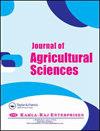茉莉酸诱导黄瓜被蛇皮霉侵染后的全身抗性
IF 0.7
Q3 AGRICULTURE, MULTIDISCIPLINARY
引用次数: 13
摘要
黄瓜萎蔫病是世界上最具破坏性的黄瓜病害之一。本文研究了茉莉酸(jasmonic acid, JA)诱导抗减湿病的潜力。用分光光度法测定了茉莉酸对植物多酚氧化酶(PPO)、过氧化物酶(PO)和过氧化氢酶(CAT)活性及总酚的影响。采用qRT-PCR方法分析了脂氧合酶、Cupi4和苯丙氨酸解氨酶3个植物防御基因的表达水平。采用滴平板法测定茉莉酸对真菌径向生长的抑制作用。与对照相比,外源施用JA降低了侵染植株的病害严重程度,但未抑制菌丝在固体培养基上的生长。结果表明,施用JA可显著提高不同浓度下的氧化酶活性。当JA浓度为400 mg L-1时,感染后48小时酶活性最高。基因表达分析显示,在48 hpi时,JA能够显著增加所有测试基因的mRNA转录。Cupi4基因在处理植株中的表达量高于其他基因。茉莉酸诱导的全身抗性是通过增加ISR标记基因的表达和增加抗氧化酶的活性来介导的。基于这些结果,我们认为JA可以作为植物抗性诱导剂外源应用。本文章由计算机程序翻译,如有差异,请以英文原文为准。
Jasmonic Acid Induced Systemic Resistance in Infected Cucumber by Pythium aphanidermatum
Damping-off disease of cucumber is one of the most destructive diseases of cucumber in worldwide. In this work, the potential of jasmonic acid (JA) for induce resistant against damping off disease was investigated. The effect of JA on activity of Polyphenol oxidase (PPO), Peroxidase (PO) and Catalase (CAT) enzymes and total phenol was assayed by spectrophotometric method. Expression level of three plant defense genes as Lipoxygenase, Cupi4 and Phenylalanine ammonia-lyase genes was analyzed using qRT-PCR method. Drop-plate method was used to assay inhibitory effect of JA on radial growth of fungi. Exogenic application of JA decreased disease severity in the infected plants but did not inhibit mycelia growth on solid medium compared to control. Our results showed that JA application substantially increased the activity of oxidative enzymes at different concentration. The highest enzyme activity was recorded after 48 hours post infection (hpi) at a concentration of 400 mg L-1 of JA. Gene expression analysis revealed that JA is differentially able to increase the mRNA transcripts of all tested genes at 48 hpi. The expression level of Cupi4 gene was higher than the other genes in treated plants. Induced systemic resistance by JA was mediated through an enhanced expression of ISR marker genes and increase of antioxidant enzymes activity. Based on these results, we suggest that exogenic application of JA could be considered as plant resistance inducer.
求助全文
通过发布文献求助,成功后即可免费获取论文全文。
去求助
来源期刊

Journal of Agricultural Sciences
AGRICULTURE, MULTIDISCIPLINARY-
CiteScore
1.80
自引率
0.00%
发文量
0
 求助内容:
求助内容: 应助结果提醒方式:
应助结果提醒方式:


